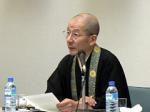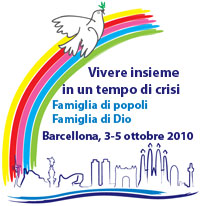
Haut Conseiller du Bouddhisme Tendaï, Japon
|
Madame/Mr. Chairman, and all people in this room, it is my great honor to be here and give a talk today.
When we think about the theme of this panel, the “Weak Strength”of Prayer,” we come up to a phase associated with less religiously-involved people in modern era.
These years, it is often said that this tendency is more remarkable in developed countries. There are not a few modern young people who express themselves as non-religious, even though their parents are Christians or their family faith is Buddhism. However, they secretly pray to God or Buddha when they run into a difficulty. In Japan, we ironically call this condition; “Danger passed, God forgotten.” These opportunists don’t think of faith usually, but ask for a help from God in a utilitarian way, when they face to a trouble. This kind of prayer is not considered from their deep faith, but may be called a kind of religious act, still.
When modern people call themselves non-religious, they seem to me to fall into two categories; the 1st, people who stay distant from religions because of their incongruous feeling to traditional system and habit that churches or temples have, even though they do not deny a religion itself. The 2nd, people who are totally rationalistic, and do not believe in anything that can’t be proved scientifically. It is true that conventions or authoritarianism, which is not directly related to the religious essence, got involved especially in traditional religious bodies in their long history and reformations have not been adequate. This happens often, and it is true that this leads people to criticize religions. Religions are seriously asked for self-reflection and to take measures to solve their problem.
On the other hand, modern rationalistic spirit denied, under the influence of marvelous development of scientific technology, a view of ideological world, which science can’t prove. It accelerates people to stay away from religions. The number of new atheists increases. Human-beings in the past had no scientific or medical technology to predict and deal with natural disasters and epidemics, and the causes of those were also beyond human understanding. There once was a period when human beings judged the disasters and epidemics to be an anger of God or Buddha, and the only thing they could do was just to pray to calm the anger.
Now science has discovered the birth of the universe, the mechanism of natural disaster, and disease-causing bacteria in modern society, and things in unclear fields became predictable, too. Accordingly not only objects of prayer became less and narrow, but also the excessive worship of science is developing rapidly. This context has led people to look at the outer world more often, and to make light of the importance of looking into oneself and praying, which is necessary for human beings to live humanly.
Buddhism points out the Three Poisons: the three major evil passions of 1)Ton, 2)Shin, and 3)Chi. 1)Ton means Greed, Buddha expresses the enormity of possessive greed of human beings as this; “Human greed never ends even after a shower of gold coins.” 2)Shin is Anger and Jealousy. 3)Chi is Ignorance. It means the condition of people who have no general ideas of what is right or wrong, or are short of consideration for others. These three poisons are strictly admonished in Buddhism, for they are considered to harm peace or well-being of social life. It is obvious that the Three Poisons have often caused many mistakes in the past human history.
Here is a good example of the historical mistakes at the discovery of the New Continent by European people in the Age of Discovery. It was regarded as a splendid achievement by the development of the art of navigation, in one-sided view. There were aboriginal peoples who had already lived in those lands and developed their own civilizations in the new land, and then, European civilization drove them and their culture off the continent by the overwhelming military power and built a new nation in the name of “justice.” But it is not too much to say that this “justice” was based on the Three Poisons: The greed to discover and reclaim new land and possess it: The anger at killing colleagues by the aboriginal peoples who resisted to them: The ignorance about not understanding their killing of aboriginal people of “savage” culture without any doubt, these three points explain the reasons. Tragedies of minor ethnics, in which human rights are threatened, still continue today all over the world. We see the same history as repressing ethnic aboriginal peoples in Japan, of course. Repressing others with the “justice” of human power is going on today still. Attacking the Republic of Iraq by the US is one of these. The US attacked Iraq for the reason of Iraq’s possessing weapons of mass destruction, but such things were not found there. I suspect that the justice the US declared was influenced by the Three Poisons of Ton, Shin, and Chi.
Human beings are facing to many serious issues in this modern era, during the reign of atheism and rationalism; Peace, human rights, environment, income disparities, population, food, water resource, etc, the Three Poisons that are inherent in human mind are suspected as the cause of these problems. It may be impossible for human beings to overcome these problems unless we eliminate or weaken the Three Poisons. Accordingly, Buddhism teaches practice of compassion. Saicho, the founder of the Tendai Buddhist Denomination on Mt. Hiei, which is called the Mother Mountain of Japanese Buddhism, left us these words; “Forgetting the self, devoting the self to the needs of others, is the ultimate compassion.” In other words, we have to stand fully in the position of others and act to benefit them. This is also the word that His Holiness Pope John Paul II quoted in the speech of His Holiness at the visit in Japan in 1981, as the most important spirit to promote interreligious dialogue. It can’t be accomplished to practice this compassionate spirit without sincere prayer to overcome self-interest on which the Three Poisons center. Rationalism can never eliminate the Three Poisons.
I had an opportunity to participate in The UN Review Conference of the Parties to the Treaty on the Non-Proliferation of Nuclear Weapons last May, representing NGOs, and I offered a suggestion to the representatives of various national governments. I, as the only representative of religions, appealed for the following: Nuclear weapons should not be prohibited just because of their massive destructive power, but we must also aim at the abolition of them standing on the recognition that they are absolute evil and should not be allowed to exist in the world: Even though A-bomb victims in Hiroshima or Nagasaki may have avoided their death miraculously, they still are suffering from A-bomb disease today 65 years after the incidence, and are exposed to danger of death: Furthermore, they live in the fear of getting ill in any minute while they have seemed healthy till today. Nuclear weapons are nothing but results of the Three Poisons.
Luckily substantial agreement of the NPT of Nuclear Weapons was adopted then, after 10 years since the last agreement in this conference, and a small step toward nuclear arms reduction was made. It was welcomed that President Obama expressed the moral responsibility to make efforts to abolish nuclear weapons as the only nation that used nuclear weapons. Responding to his speech, many Japanese people wish, as the first step to take his responsibility, for President Obama to visit Hiroshima, where the A-bomb was dropped. Mr. Ban Ki-Moon, UN Secretary General participated in the memorial ceremony for the victims of A-bomb, held in Hiroshima on the memorial day of August 6 this year. He announced a message appealing for the abolishing of nuclear weapons, and that encouraged not just Japanese people but also many people of the world who seek for the same.
Not a few in the US still recognize that the use of A-bombs was a right thing to end the war, and oppose President Obama’s visit to Hiroshima for the reason that there is an anxiety over possible apologies for dropping the A-bomb. On the memorial monument of A-bomb victims in Hiroshima is inscribed this sentence; “Please rest in peace, we will never repeat the mistake.” They have no grudge against A-bombing, but they must make sure that no human-beings should ever experience the pain of A-bomb victims like us. This context is the very spirit of compassion; forgetting the self, devoting the self to the needs of others. This is the very wish, this is the prayer of A-bomb victims.
Human beings have achieved so much benefit from the development of scientific technology, and may achieve more after this. But our negative inheritance is also increasing, for we are losing control over our mind. Not a few mistakes in them are irreparable. Not to repeat the mistakes on reflection, we need to keep constant vigilance for the sake of others. It is important for us to repent our defection and devote a humble prayer to God and Buddha, as a man of fragility, who tends to lose control over his mind easily. I think that now is the time when our deeper prayers are much needed for a man who has gained such strong power in our time. We should learn that the weaker our prayer gets, the farther true solutions to human problems recede.
I appreciate your patient attention to my talk; thank you so much.
|

